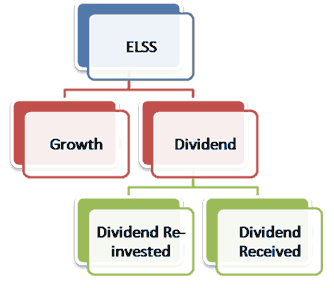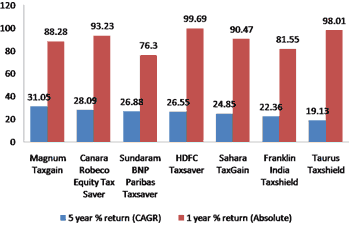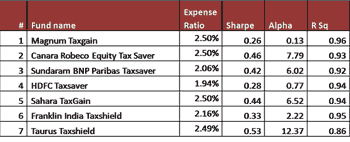
Equity-linked saving schemes (ELSS), popularly known as tax-saving mutual funds, are a category of mutual funds where a major portion is invested in equity and equity-related instruments. Investment up to Rs 1 lakh is exempted from income under section 80C but there is a lock in of three years before which you can not withdraw. However, there is no upper limit on investments and long-term capital appreciations are tax free. Dividends received are also tax-free in the hands of the investor.
ELSS is a great instrument for tax planning which also ensures good returns. But investment should be carefully planned and you should devote sufficient time in selecting the right fund.
www.investmentyogi.com is a one-stop personal finance website which helps in managing finances, investments and taxes through services like financial planning, online tax filing, budgeting and 'Ask the Expert'.

Growth
Investor does not get any income during the tenure of the investment. He will get a lump sum amount at the time of redemption or on maturity.
Dividend
Investor gets a dividend from the fund house. He has two options:
In most funds you have Growth as well as Dividend options which you can choose depending upon your priorities.

We present the top seven funds based on last five years' performance in the table alongside.
How to choose a fund for investing?
A good track record is no guarantee for future performance. You should also look at some quantitative measures to evaluate which fund is good for you.
Expense Ratio
Denotes the annual expenses of the funds, including the management fee, and administrative cost. Lower expense ratio is better
Sharpe Ratio
An indicator of whether an investment's return is due to smart investing decisions or a result of excess risk. Higher Sharpe Ratio is better
Alpha Ratio
Measures risk relative to the market or benchmark index. For investors, the more positive an alpha is, the better it is.
R-squared
Measures the percentage of an investment's movement that are attributable to movements in its benchmark index. A mutual fund should have a balance in R-square and ideally it should not be more than 90 and less than 80.

Choice depends upon your risk profile and priorities. You should take an investment decision based on overall financial planning.
Large-Cap Funds
These funds mostly invest in the large cap companies. While this may mean muted returns when the markets are rising, it also may mean a limited downside when the going gets tough. Franklin India Tax shield and SBI Magnum Tax gain are a few examples of this type.
Growth Funds
These funds have about 30 per cent exposure to mid-caps, 10 per cent to small-caps and the rest in large-caps in its portfolio. Hence it may give a higher return in rising markets. Sundaram BNP Paribas Tax saver is a good option in this category.
Mid-cap Funds
No pain, no gain. These funds have a sizeable exposure to mid-caps and small-caps. This aggressive investment style can pay rich rewards. Sahara Tax Gain and HDFC Taxsaver are good examples of fund in this class.
Small-Cap Funds
Small-cap stocks can act like performance enhancing drugs. In the above discussed types, the maximum allocation to small-caps is 12 per cent. However, Taurus Tax shield has invested almost 30 per cent in this high-risk zone. This can be very rewarding when the going is good, but a dream run can easily become a nightmare. Taurus Tax shield has given 98.01 per cent returns in the last one year.
You should do sufficient analysis before taking investment decisions. It should be guided by your overall financial situation, goals and risk profile. A financial plan is recommended before making investment decisions. SIP (Systematic Investment Plan) for a long time horizon is the most recommended way to invest in equity funds. You should avoid lump sum investment especially when the market is on a high.